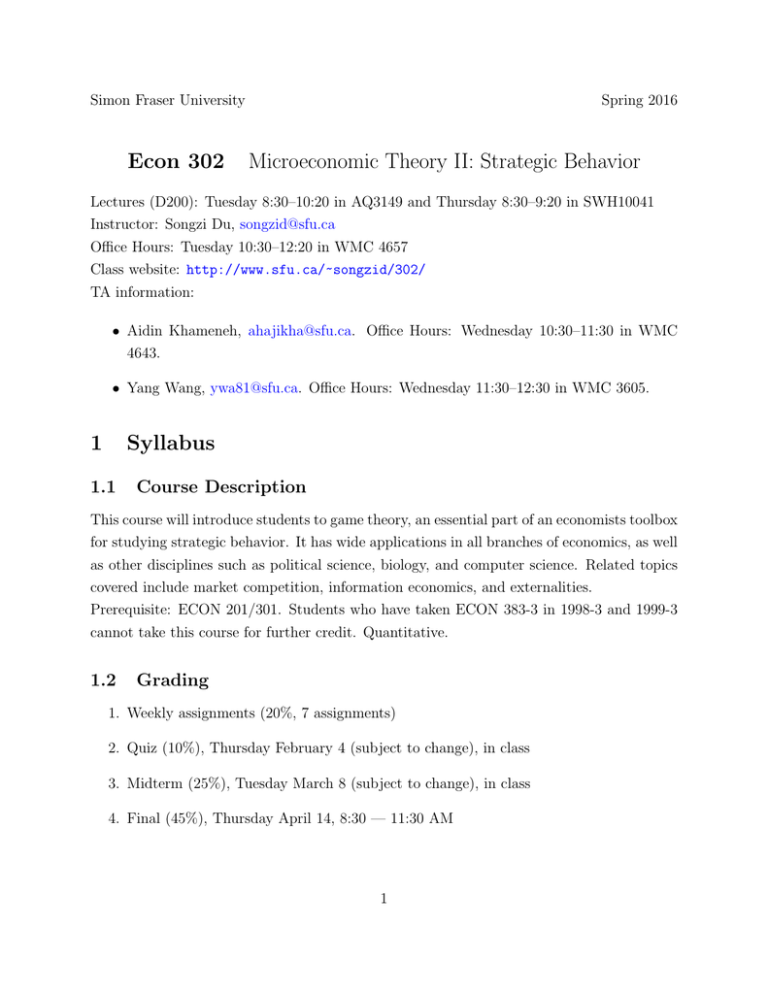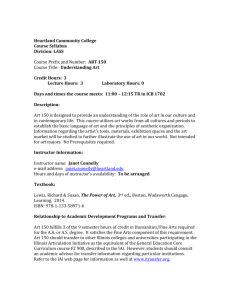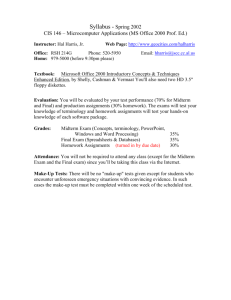Econ 302 Microeconomic Theory II: Strategic Behavior
advertisement

Simon Fraser University Econ 302 Spring 2016 Microeconomic Theory II: Strategic Behavior Lectures (D200): Tuesday 8:30–10:20 in AQ3149 and Thursday 8:30–9:20 in SWH10041 Instructor: Songzi Du, songzid@sfu.ca Office Hours: Tuesday 10:30–12:20 in WMC 4657 Class website: http://www.sfu.ca/~songzid/302/ TA information: • Aidin Khameneh, ahajikha@sfu.ca. Office Hours: Wednesday 10:30–11:30 in WMC 4643. • Yang Wang, ywa81@sfu.ca. Office Hours: Wednesday 11:30–12:30 in WMC 3605. 1 Syllabus 1.1 Course Description This course will introduce students to game theory, an essential part of an economists toolbox for studying strategic behavior. It has wide applications in all branches of economics, as well as other disciplines such as political science, biology, and computer science. Related topics covered include market competition, information economics, and externalities. Prerequisite: ECON 201/301. Students who have taken ECON 383-3 in 1998-3 and 1999-3 cannot take this course for further credit. Quantitative. 1.2 Grading 1. Weekly assignments (20%, 7 assignments) 2. Quiz (10%), Thursday February 4 (subject to change), in class 3. Midterm (25%), Tuesday March 8 (subject to change), in class 4. Final (45%), Thursday April 14, 8:30 — 11:30 AM 1 Grades are “curved” according to the Economics department guidelines. Half of the quiz and midterm points can be transferred to the final; this means that your total points are weighted either according to the original weights (see above) or to the transferred weights (20% assignments, 5% quiz, 12.5% midterm, and 62.5% final); you automatically get the higher of the two methods of weighting. 1.3 Textbooks There is no required textbook for this class; the lecture slides will be posted online (but take notes anyway). However, I recommend reading the following textbook: Watson, Joel (2013). Strategy: An Introduction to Game Theory. Third Edition. W. W. Norton & Company. 2 2.1 Course Policies Communication You are responsible for checking the class website and reading all emails sent to you by the course staff. Website and emails may contain important announcements. 2.2 Tutorial Attendance in tutorial is mandatory. The TA will discuss assignment problems in the tutorial. 2.3 Assignments Seven assignments are assigned. Given the short turnaround, your assignment is marked for completeness only. Treat the assignments as practices for the midterm and the final. It is your responsibility to check your assignment solution against the solution posted online. Do not think your solution to the assignment is correct just because you got full marks, since your assignment is marked for completeness only. Assignments will not be regraded, and late assignment will not be accepted, for the obvious reason. You can of course ask your TA to explain your marks. 2 You are allowed and encouraged to help each other, but each of you must write up your own solutions. So, by all means, discuss the problems before working on them and compare your answers afterwards, but do not compose group solutions, copy someone else’s answers, or let another student copy yours. If we notice solutions that are suspiciously similar, we will proceed according to university guidelines for potential cases of academic dishonesty. 2.4 Exams (Quiz, Midterm, and Final) The exams are closed-book. You may bring a simple (non-graphing) calculator. Write out all steps in your reasoning and calculation when answering an exam question. If you want your quiz or midterm exam to be eligible for a regrade, write in pen. 2.5 Missing an Assignment or an Exam You will receive a “0” on the missing piece of work, with no makeup, except in the case of: 1. a medical emergency: provide a complete Health Care Provider Statement (see http:// www.sfu.ca/students/health/resources/faq/sick-notes.html) within 2 days of the exam — this is the ONLY form that I will accept, and a scanned copy is fine; you must also email me within 24 hours of the start of the final if you missed the final for a medical emergency. I will approve or disapprove each medical emergency on a case-by-case basis. Since a medical emergency is by definition rare, I do not believe multiple medical emergencies can happen to a student in one semester. 2. a documented reason that is approved by me for the assignments, quiz and midterm at least seven days in advance. For missing the final, only religious reason can be approved — email me by the end of the first week if you will miss the final exam due to a religious reason. If (1) or (2) is satisfied for a piece of missing work that is not the final, your points for that missing work can be transferred to the final. If (1) or (2) is satisfied for the final, you can take a make-up final exam. 2.6 Regrade Policy for Exams If there is a mistake in totaling points, just show your exam to your TA and do not formally request a regrade. Your grade will be changed automatically. 3 To request more points on a particular question, you must have answered the question in pen (for quiz and midterm), and there must be no reason to believe that your solutions may have been altered. You must also do BOTH of the following: 1. Detail, in writing, where and why you believe there was an error. Use separate sheets; do not write on your exam booklet, and do not use email. Generic statements such as, but not limited to, “my explanation was close” or “I deserve partial credit” do not satisfy this requirement: you must be specific about which parts of your answer deserve more credit and how they relate to a correct solution. 2. Submit your request (which must include all parts of your original exam booklet and your explanations for regrade) to your TA or Professor Du within ten days from the first day when the exam is handed back or available for viewing. If your request does not satisfy both of the above criteria, it will be rejected. Make sure to include ALL disputed questions on your request: you can submit at most one request per exam. Professor Du or a TA will regrade the listed question(s): your score may increase, stay the same, or decrease. You will also lose points if Professor Du or the TA notices that too many points have been awarded anywhere else on the exam. 3 Why 302 is difficult, and what you can do about it? Many of you will find this course very challenging, for several reasons: 1. This course builds on material from ECON 103, 301, MATH 157 and BUEC 232. Some of you might have struggled in one or more of those courses. If thats you, be prepared to do some review and work extra hard in ECON 302. 2. The objective in this course is for you to understand certain concepts well enough that you can use them to analyze new situations. It is NOT for you to learn how to solve specific problems — that’d be pretty useless since you’ll probably never see these exact problems again. For this reason, exam questions may look nothing like problem set or book questions. (However, they will, of course, test the same ideas.) If you are used to getting by through memorization, you will need to change your studying method. Don’t just know how to do practice problems. Know why the solution is constructed in a certain way, so that you can build a 4 new solution when facing a different problem. This is hard work, but it makes the difference between superficial and true understanding. 3. Economics is the most quantitative social science, and microeconomic theory is among the most quantitative areas in economics. If you have problems with math, watch out! Try to work with someone that is good at math on problem sets. That said, the actual math used wont be advanced — it’s the problem-solving part that you might find challenging. 4. Some of you may find the assignments challenging and time-consuming. Remember that this is a 4-credit course with no papers and few readings (which aren’t even required)! Don’t wait until the last day to do the assignments. They can make a huge difference in your grade, so make sure you get those assignment points. 5. At SFU, there are two semesters of required intermediate microeconomics, while many universities have only one. We do not cover twice as much material, but some topics are covered in greater depth, at an advanced undergraduate level. As a result, you will be learning some concepts that may not be covered in standard intermediate textbooks. 5



